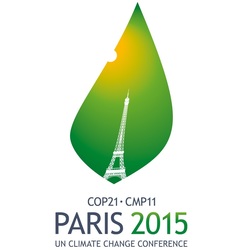 The 21st Conference of the Parties (COP 21) to the United Nations Framework Convention on Climate Change (UNFCCC) is scheduled to occur in Paris, France from November 30th through December 11th 2015. There are exceptionally high expectations for this year’s conference; it is anticipated a new international climate change agreement will be agreed upon by all of the member states. Here is a breakdown of the impending agreement: WHO is involved in the new agreement? All member nations of the UNFCCC will be involved in creating the new international climate change agreement. WHAT will the new agreement include? The new agreement will be different from the Kyoto Protocol (click here to learn more about the Kyoto Protocol à Kyoto Protocol). Instead of having one global standard that all nations must “commit” to, the new agreement will have each nation propose a “contribution” on behalf of their country. Each nation will create a plan called, Intended Nationally Determined Contributions (INDCs). Although there is currently no standard for what will be included in these plans, generally it is expected that INDCs will include mitigation plans, emissions reductions, adaptation efforts, capacity building etc. WHY is a new agreement so important? The Kyoto Protocol did not achieve the goal of reducing the amount of global emissions released and halting the warming of the climate. Many nations (the United States included) never even ratified the Kyoto Protocol. By changing the terminology from commitment to contribution, and allowing individual nations to create their own plans, the hope is that more nations will approve of the new agreement. The climate is continuing to change, entire countries are disappearing as sea level rises (click here to learn about the country of Tuvalu and their struggle with sea level rise Tuvalu), storms are worsening, traditional lifestyles are impacted, and plants and animals are dying off. Climate Change is a global problem and needs to be addressed at a global level. A new international agreement is a step in the right direction. For more information on the coming conference and international agreement see Expectations For more information on COP 21 in Paris see COP21 Keep following our blog to see what happens at COP 21!
6 Comments
28/11/2015 05:02:00 pm
Hello Jill Leaness,
Reply
Nick Maida
29/11/2015 01:57:48 pm
Do you think that the Kyoto protocol did not get ratified by many countries because the restrictions were to rigid to adhere to? Are there any other measures to ensure that the new plan, besides allowing each country to create their own "contribution"?
Reply
Kelly Rodriguez
29/11/2015 06:56:43 pm
It would be nice to know all the members of the UNFCCC, I obviously could easily google it, but it was very convenient and informative to have a link that explained the Kyoto Protocol. This blog was extremely informative. As I was reading I asked little questions like what is the protocol, how will the new agreement be more effective, and what countries are disappearing. All of those questions were answered. Just one question, why do you think the Kyoto Protocol was so unsuccessful?
Reply
Ray Smith
29/11/2015 08:46:21 pm
With many nations not ratifying the Kyoto Protocol and only having a "hope" that they will ratify the new policy, why isn't a penalty enacted by the somebody each of the participating countries are accountable to? You mentioned that all of these nations are a part of the UNFCCC and will be developing their own standards. Why not have a mandated "passing protocol" that each nation must agree to before their individual policy is deemed ok? If nations do not meet their standards, or do not "pass", then they will be punished accordingly.
Reply
Mark R
30/11/2015 07:35:49 am
I like the idea of having each country contribute individually but the lack of a standard is concerning. Without having a set description of what is expected to be done by each country I find it hard to believe that they would get much done, or get as much done as if they were to be told what is supposed to be done by them. It is easier to be held accountable if you tell them exactly what you want them to do.
Reply
With each country being allowed to decide how they will contribute, will there be any changes? It has been my experience with both children and adults that unless there is a punishment or incentive of some kind, people do not normal care enough to change their ways. Is there going to be any kind of incentive or punishment to encourage countries to contribute?
Reply
Leave a Reply. |
Categories
All
Archives
March 2024
|
 RSS Feed
RSS Feed
